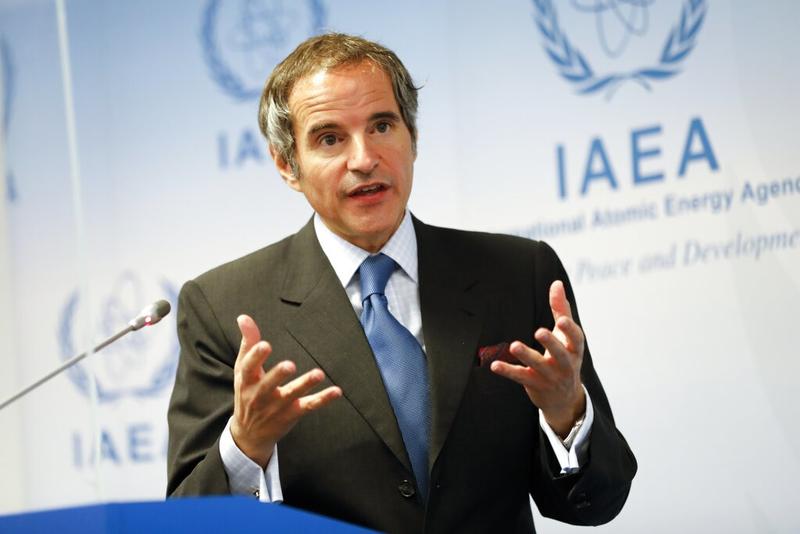 Director-General of the International Atomic Energy Agency Rafael Mariano Grossi addresses the media during a news conference behind plexiglass shields regarding the agency's monitoring of Iran's nuclear energy program, at the International Center in Vienna, Austria, June 7, 2021. (LISA LEUTNER / AP)
Director-General of the International Atomic Energy Agency Rafael Mariano Grossi addresses the media during a news conference behind plexiglass shields regarding the agency's monitoring of Iran's nuclear energy program, at the International Center in Vienna, Austria, June 7, 2021. (LISA LEUTNER / AP)
MILAN - Reviving the 2015 Iran nuclear accord will have to await the formation of a new Iranian government, the head of the UN nuclear watchdog said in remarks published on Wednesday, adding a deal needed political will from all parties.
"Everyone knows that, at this point, it will be necessary to wait for the new Iranian government," Rafael Grossi said in an interview with Italian daily La Repubblica, in reply to a question about what stage negotiations on the deal were at.
Iran is due to hold its presidential election on Friday. The new president is expected to name his cabinet by mid-August
ALSO READ: Iran and IAEA extend monitoring deal by a month
Grossi, director-general of the International Atomic Energy Agency (IAEA), appeared to be referring to Iran's presidential election, due on Friday.
Two candidates have withdrawn from the election, state media reported on Wednesday, in moves apparently aimed at boosting the chances of leading hardline and moderate contenders. Last month, the Islamic Republic's hardline Guardian Council approved just seven presidential hopefuls to stand in the election.
Iran's new president is expected to name his cabinet by mid-August. The term of current President Hassan Rouhani ends on Aug 3, a government spokesman said.
The sixth round of talks to revive the deal resumed in Vienna on Saturday between Iran and world powers.
READ MORE: Iran says it produced 6.5 kg of uranium enriched to 60%
Iran said it may renew a key nuclear monitoring agreement with the IAEA, potentially buying more time for world powers to broker an arrangement between Tehran and Washington to revive their atomic deal.
Mahmoud Vaezi, Rouhani's chief of staff, said the extension of the temporary inspections pact with the IAEA will happen only if there’s progress at the current round of talks in Vienna over how to restore the nuclear accord, according to a statement on the Iranian government’s official website.
The IAEA does not take any direct part in the negotiations but has been called on to verify them and continue inspections in the country.
"The discussions that have been going on for weeks have dealt with very complex and delicate technical questions, but what is needed is the political will of the parties," Grossi said.
Vaezi said he hopes there will be “good news in the coming weeks” from the negotiations, and reiterated the parties have agreed on “many important economic issues,” without giving details. Rouhani, who helped broker the original deal, is keen to see it fully restored before August when he’s widely expected to be replaced by a hardline conservative following Friday’s election.
With Bloomberg inputs


